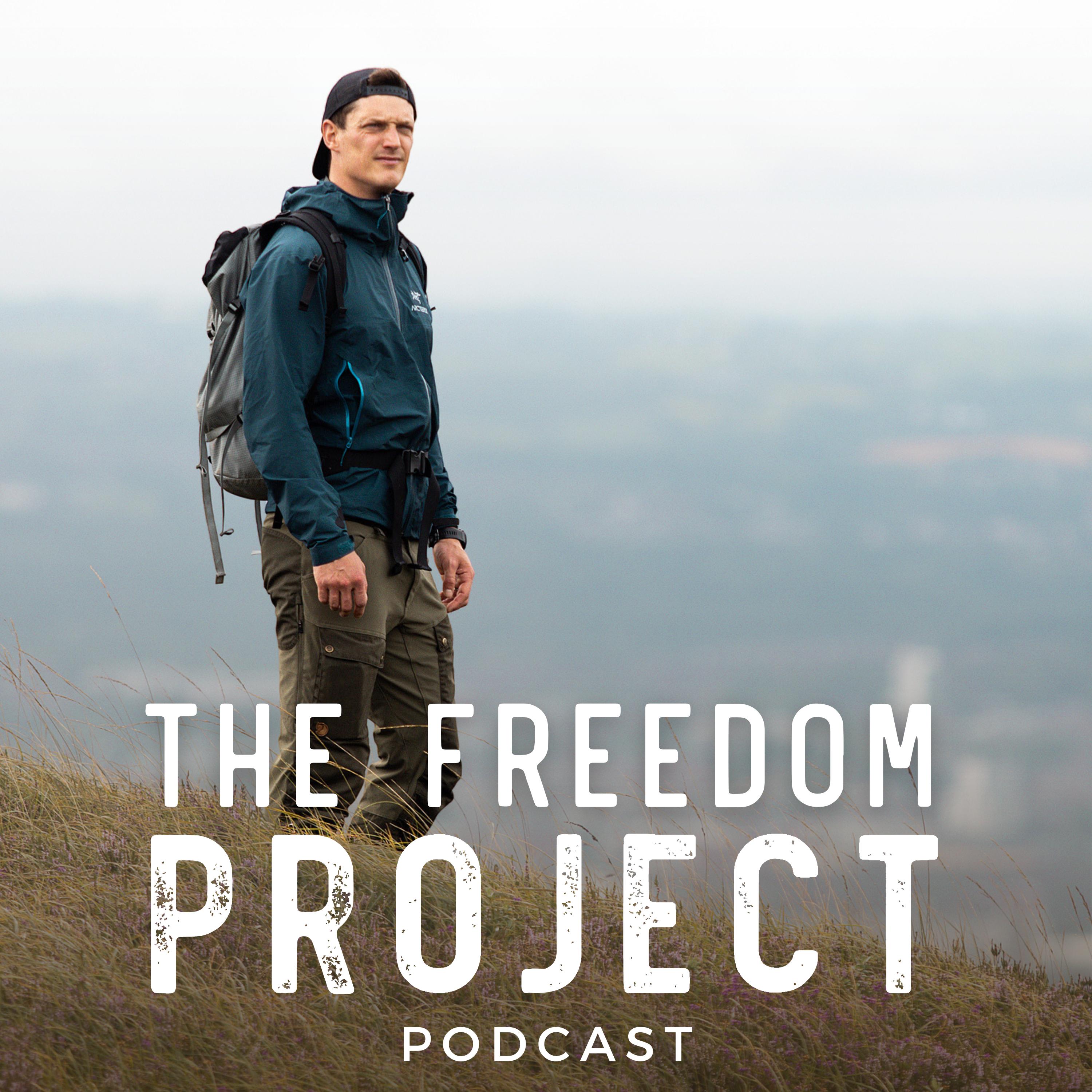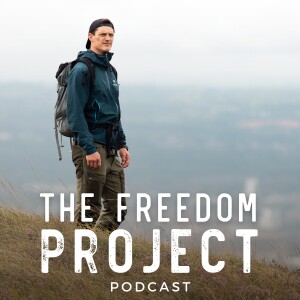
Do you crave freedom & want to hit peak mental fitness? The Freedom Project is here fore those of you who live for adventure and freedom. Your host, Tom Foxley, is a mental fitness coach, former Royal Marines Commando, a freedom seeker, skier, mountaineer, and climber who lives for adventure. Tom has been coaching elite performers for more than a decade. In The Freedom Project, Tom aims to uncover what it takes to hit peak mental fitness for freedom seekers. Once per week, Tom will also get highly tactical and teach you strategies you can deploy into your own life. If you want to learn peak mental fitness, and love creating freedom, this is the podcast for you. www.instagram.com/tomfoxley
Episodes

Wednesday Sep 06, 2023
S3E21: The 6 High Performance Tools My Entrepreneur Clients Can’t Live Without
Wednesday Sep 06, 2023
Wednesday Sep 06, 2023
-
The absolute best meditation app money can buy (that may be free to you)
-
The most overlooked tool you already have but never use properly
-
A way to supercharge your sleep & build your capacity for resilience
-
A 3 minute tool that tells you the most important things to focus on
-
How to track your physiological data with ease
-
A concrete way to track your habits & performance

Friday Sep 01, 2023
Friday Sep 01, 2023
Kevin Gaskell is an Entrepreneur, business owner, leadership speaker and adventurer.
In the boardroom, Kevin has been responsible for revitalising Porsche on the cusp of collapse in the early 90s.
Outside of the business world, he has set the world record for the fastest row across the Atlantic Ocean, has been to both Poles twice and climbed some of the world's highest peaks.
In this conversation we cover:
- The Parallels of mentality needed in the middle of the Atlantic & to revitalise a global Icon
- How limits exist solely in our head.
- How cultural bounce helps build the perfect team and
- How to make your adventures actually happen despite a busy life.

Wednesday Aug 30, 2023
S3E19: Optimising Your Life For Max Freedom & Adventure: 4 Essential Ground Rules
Wednesday Aug 30, 2023
Wednesday Aug 30, 2023
My clients seek two things above everything else: adventure, and freedom. These are the four rules I teach them to shortcut the time it takes them to reach it.
I learned these the (very) hard way. My clients pay top-dollar for my help implementing them. In this podcast, I’m going to give you them for free.
I started my first business because I wanted ultimate freedom. It ended up trapping me because I failed to follow these rules.
I don’t want that to happen to you.
These rules aren’t obvious, but they’re sure as f**k useful. And their battle tested in hundreds of lives.

Friday Aug 25, 2023
S3E18: Untapped Potential to Unstoppable w/ Coach Louis Papot
Friday Aug 25, 2023
Friday Aug 25, 2023
Today's guest is Louis Papot.
Louis is a client of mine who has been working with me for the past nine months.
He is a fantastic coach within the fitness realm & in this episode we discuss the main lessons he's learnt to him forward in his mindset, diving deep into values and how to apply that for yourself.
Louis' Instagram : coach_louis_pap

Wednesday Aug 23, 2023
S3E17: How To Be 1% Better Every Single Day
Wednesday Aug 23, 2023
Wednesday Aug 23, 2023
The theme that unites you - the readers of this blog - is the drive to become better.
It’s also what makes you and I the same.
I’m obsessed with becoming better.
But aside from the phrase “I want to be the best version of myself”, you probably don’t know what that actually looks like for you, and have even less idea of how to actually do that.
So in today’s podcast, I’m going to show you step-by-step how to become better each day.
So that this time next year you’re not looking back at another 12 months of no stagnation.
Most people stay stuck - or at least living below the life they actually want - because they lack a system to consistently make change.
They continue to take the easy path, not the one of growth because they don’t have a process.
Every time you choose the easy path you choose to be a worse version of yourself and have a less satisfactory life.
This easy choice doesn’t just affect you and your life, but those around you too.
By the end of today, you’ll know:
- Precisely what you need to focus on to grow as a person
- How to overcome the low moments
- What your character training plan exactly looks like
- How to sustain your growth for ever and never plateau

Friday Aug 18, 2023
S3E16: The Controversy of Male Compassion w/ George from TheTinMen
Friday Aug 18, 2023
Friday Aug 18, 2023
Today’s guest is George from TheTinMen.
George fearlessly dives into uncomfortable conversations and unearths the raw truths often left unspoken.
Through his platform @TheTinMen, he sheds light on the lesser explored aspects on gender equality.
In today’s episode, the topics we cover are :
- What we don’t know about male suicide
- Why therapy for men doesn’t always work
- Gender pay gap
- The education crisis boys find themselves in
Find George on Instagram : @thetinmen

Wednesday Aug 16, 2023
S3E15: How To Use Personality Tests To Become A Better Business Owner
Wednesday Aug 16, 2023
Wednesday Aug 16, 2023
-
Which personality tests actually work, and where to find them
-
How to interpret your results
-
Plans for balancing out your weaknesses

Friday Aug 11, 2023
S3E14: Transforming The Definition of Success w/ Tim Stevenson
Friday Aug 11, 2023
Friday Aug 11, 2023
In today’s show, we are joined by the wonderful Tim Stevenson. An entrepreneur, healthy enthusiast and an advocate for living to the fullest.
In this episode we will take a deep dive into the roles we play in our life & the art of setting up a successful business (especially when you aren’t employable).
Tim will also share his top 3 exercises for maintaining optimal shoulder health & embracing freedom.
Tim's Website: https://www.dynamicshoulders.com/
Tim's Instagram: https://www.instagram.com/dynamicshoulders/?hl=en

Wednesday Aug 09, 2023
S3E13: Stoicism Applied
Wednesday Aug 09, 2023
Wednesday Aug 09, 2023
-
Maintain positivity and belief whatever the challenge
-
Make huge progress on your biggest struggle
-
Find more calm and centredness in everyday life
-
Develop insane discipline and focus

Friday Aug 04, 2023
S3E12: The Pursuit of Adventure w/ Tom Grant
Friday Aug 04, 2023
Friday Aug 04, 2023
On today's show, I am joined by Tom Grant.
Tom is an IFMJA Mountain Guide, who specialises in steep skiing, he is a climber and alpinist.
Earlier this year, Tom was my mountain guide, and I instantly got the impression of his mindset as calm, focussed, purposeful and much more.
In this episode, we explore Tom’s mindset, where it comes from and how you can apply it to your training, life and business.
We discuss his recent injury, his pursuit of excellence, betterment and stepping outside your comfort zone time and time again.
I really enjoyed recording this episode, and I’m sure you will too!
